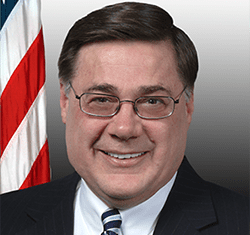(Part II) One-on-one with Brookhaven Supervisor Ed Romaine
Brookhaven Town Supervisor Ed Romaine (R) has encountered several hurdles throughout his tenure. In Part II of this two-part series, he forecasts the upcoming redistricting process for the town council, highlights the challenges of offering adequate public transportation to Brookhaven residents and shares the lessons learned from his decades in public office.
What are your expectations for the upcoming redistricting of the Brookhaven Town Council?
I don’t expect many changes whatsoever. I don’t expect it to be controversial. There will be some people who are partisan who will want to make it controversial, but it will not be partisan.
I expect it will be done fairly. I do not expect many changes at all. I do expect that the minority-majority district stays together, and that’s the district that includes North Bellport and Gordon Heights, which are the two major minority areas in our town, as well as Coram.
So I don’t expect many changes at all. The only changes that would have to be made are for the shift in population that the [2020] Census would project.
Now I don’t have anything to do with redistricting. We have a Redistricting Committee and we are waiting for the Redistricting Committee to come and offer choices, which will be discussed by everyone on the Town Board.
But the council will be voting on the maps, correct?
At some point, but I’m not going to vote for any major changes. I expect there to be only minor changes as reflected by a shift in population. And I do expect to keep the 4th [Council] District together, which includes Gordon Heights and North Bellport, so that those major minority communities continue to have the opportunity for representation.
In draft maps circulated by the Redistricting Committee, there is a proposal to split the Port Jefferson Station/Terryville community, along with Mount Sinai, between two council districts. Would you vote under any scenario to separate those communities of interest?
There might be a scenario in which I would take a look at that. You’re asking a simple question to a complicated answer. There are other factors that you have to take into account, such as keeping a minority district intact. The second district, which is represented by Jane Bonner [R-Rocky Point], has to grow. Where does that grow? How does that affect things?
If we don’t do that, how does that affect the other districts? Because it’s like a Rubik’s Cube: You have to turn all the sides to get it perfect. I want to hear their explanation and I certainly want to listen to why they thought that was the better choice. I want to listen to that, and I’m not about to rush to judgment on anything without hearing a full explanation, and I’m sure those issues will be raised at our public hearing.
What are your thoughts on the state of public transit in your township?
I am a huge supporter of public transportation because there are a lot of people that depend on it. The bus system in this county is so broken. We don’t get even half of the subsidy that Nassau County gets. It’s just incredible, the lack of coordination between buses and trains, which is so needed because not everyone owns a car or wants to use a car.
Do you believe that the Long Island Rail Road is doing enough to expand services into Brookhaven?
I live in the largest town [by area] and the second most populous town in the State of New York, and yet it is served by 19th-century technology: diesel, which is a polluting, dirty fuel.
I have been beating and beating on this issue since the day I came here. We should have had electrification of all of our lines much earlier than this and we’re still arguing over it. Every year we argue that, the price goes up. So we’re stuck with diesel, which is a polluting fuel.
Other than a mile on the main line in Ronkonkoma, all of my three lines — the southern, the main line and the northern line — are all diesel. Electric ends at Huntington, and from Huntington to Port Jeff it’s all diesel. Electric ends at Ronkonkoma and everything east is diesel. Electric ends on the Montauk line at Babylon, and everything east is diesel.
The investment has been skewed away from this Island. Our voice has not been raised, there hasn’t been an investment in providing modern technology. And I’m talking about 20th-century technology, which is electric; 21st-century technology is maglev [a train technology supported by magnetic repulsion] … Forget it, they’re not even talking about the future.
Most 20th-century technology has bypassed my town because the [Metropolitan Transportation Authority] has not made any investment. All the money seems to be funneled into the City of New York. We have a million-and-a-half people out here in Suffolk County, and that’s wrong.
It’s so frustrating. I am passionate about these issues and I am in public office to do something, not to sit here and collect a salary but to do something and to make a change for the better for everyone in this town.
Could you summarize your approach to budgeting, taxation and public expenditures?
I believe there’s a role for public expenditures. I also believe, living as I do on Long Island, that our taxes are way too high and that we have too many levels of government. It’s amazing: If you go elsewhere in the United States, you don’t have all the levels of government that we have here.
I’m a great believer in — as much as possible — not raising taxes and being fiscally responsible. Someone said, “Can you sum up your political philosophy?” Yeah, I’m a fiscal conservative, a social moderate and an environmental liberal. It’s really simple.
When I arrived, it was no fault of Supervisor [Mark] Lesko [D] or Supervisor [Brian] Foley [D], both of whom I had known for many, many years, that they were caught up in the 2008 recession. Things were bad, the town had taken on debt and we were not viewed as financially stable.
When I came [into office], I said, “Let me see the last audit.” The audit had numerous exceptions that pointed out the failings of the town. I worked on that audit and those exceptions to improve our financial condition. And I have to say, I am blessed with a very good finance commissioner, Tamara Branson. She is very, very good, along with a number of other people in the finance department.
I worked with them and the following year, the rating agencies gave the town a AAA bond rating and we’ve never had less for as long as I have been supervisor. We’ve always stayed at or below the tax cap and have always tried to limit and look at things on how we could be more efficient in delivering services because there’s a tremendous amount of inefficiency built into governmental services.
What motivates you to continue your work to this day?
I’m motivated because I see that with effort and energy, you can make a difference, if only incrementally. I am about doing all I can to move Brookhaven forward. I owe it to the people that elected me.
There are a lot of bad things about public life, but the great thing is that you meet a lot of great people. You get involved with civics and other organizations; you see people donating their time and energy for the public good; and it’s great to work with people like that. We have a lot of nonprofits and civics that we work with to make this town better.
That keeps my motivation going, and I’m just going to continue to do that and focus on the job as supervisor every day I come to work, whether it’s on the small problems or the big problems.
Looking back, which project or initiative are you proudest of? And conversely, what do you view as your greatest setback along the way?
I would say that the things I’m proudest of are saving as much open space and farmland as possible — both as a [county] legislator and a supervisor — and putting a plan together to preserve the Carmans River Watershed. I view that as a tremendous achievement, not of myself, but something that will endure because it will mean that these areas will not be developed.
My greatest disappointment is not getting people to do the right thing, like the MTA with electrification, or the [New York Department of Environmental Conservation] on working with us to strengthen recycling. These are all regulatory things, and we need people to be less regulatory and more innovative in terms of approaching issues such as recycling and mass transit.
Also, I have been here for a while and I see the structure of government. Brookhaven would be much better off by itself as a county. To have one level of government to be able to go to and get things accomplished would probably be better, but that’s not practicable and that’s not happening.
That being said, you set yourself up, you work at it every day, and hopefully you will make a difference. The biggest thing I can do when I’m eventually retired is to look back upon the town and say, “I left it better than when I found it.”
What do you consider to be your legacy at Town Hall?
I think it would be embodied in the phrase, “Save what’s left.”
Is there anything else you would like to say to our readers?
First of all, I’m very honored to be a supervisor and I remind myself every day of what an honor it is to serve the people of Brookhaven, who have been extremely kind to me by electing me by large margins each time I’ve run. They have given me the confidence and the faith to do their work every day.
I am so lucky to have the trust and support of the majority of the people in this town. I don’t forget it and I am very grateful for it, so I would say thank you for the opportunity to serve. I hope that those who follow me come with the same passion, commitment and dedication. And I am sure that there are many who came before me who did the same.
If we can continue that, our society is going to be a good society and my grandchildren are going to grow up in this town. I am just honored to be here.






